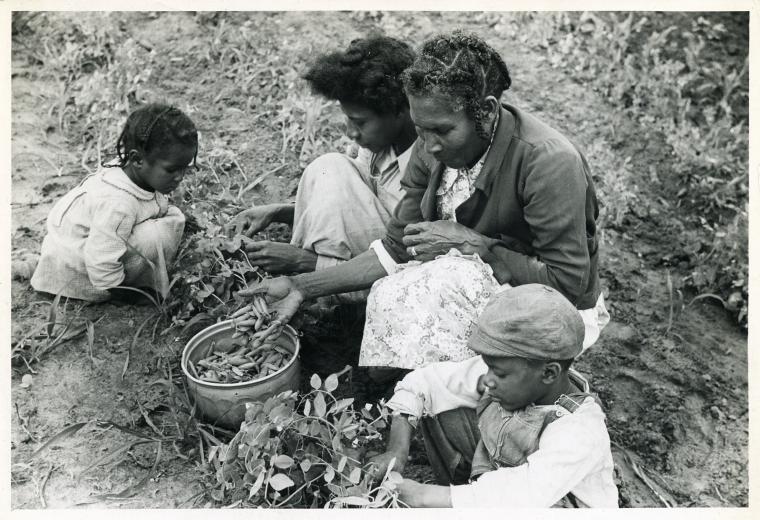Feed Your Mind & Nourish Your Soul on Earth Day
Earth Day, on April 22, is a time to bring attention to protecting the environment. The day can also serve as a starting point to learn more about the impact of climate change, environmental racism, and ecology on Black people across the U.S.
Whether you are looking to read a news article, take an in-depth look, or view historical photos, explore the Schomburg Center’s and The New York Public Library’s digital resources to help spark or further expand the conversation.
#SYLLABUS WEB ARCHIVE COLLECTION

The #Syllabus Web Archive Collection is an educational resource inspired by topics that generate interest and conversation on social media. Materials curated are designed to encourage self-guide or group study.
“As we experience climate change and environmental racism, these resources invite us to participate in the conversation in a critical, informed and active way,” said Zakiya Collier, a digital archivist in the Manuscripts, Archives, and Rare Books Division.
“They encourage us to not only reconnect with the earth, but also to connect to the people and communities around us to learn and reclaim the ecological knowledge needed to combat and survive climate change and environmental racism.”
#FromFlintToDAPL: Contextualizing Environmental Racism
We Need Histories of Radical Black Ecology Now – Black Perspectives
#BlackEcologies – Black Perspectives
Black Ecology – Bilphena’s Library
Hurricane Katrina & Race: Scholarship at Five Year Anniversary – Racism Review
ACTIVISTS AND ENVIRONMENTALISTS

Many people know Fannie Lou Hamer for her civil rights work, but did you know she was the founder of the Freedom Farm Cooperative? Through a $10,000 donation, Hamer purchased 40 acres of land in Mississippi to form her organization. Members who joined worked on the land for a few hours in exchange for food such as butter beans, cucumbers, and squash.
“She believed in land ownership and cooperative agriculture as a route to self-sufficiency for Black people,” Collier said.
Benjamin Banneker is perhaps best known for assisting with the survey of land ceded by Maryland and Virginia, which went on to become Washington, D.C. He was also a noted mathematician, farmer, and author.
“Banneker grew up on a farm outside of Baltimore where he taught himself astronomy by watching the stars,” Collier added. “His almanacs included astrological information, social commentary, medical information, and much more.”
In 1791, he wrote a letter to Thomas Jefferson, who was then the U.S. Secretary of State, urging the future President to think of African Americans as more than enslaved people. Banneker also enclosed a handwritten manuscript of his 1792 almanac.
Use your New York Public Library card to borrow Fannie Lou Hamer: Acts of Courage by Terry Barber and Memoir of Benjamin Banneker: Read Before the Maryland Historical Society, at the Monthly Meeting, May 1, 1845 by John H.B. Latrobe to learn more about both.
RECOMMENDED READS

Nature and the land serve as backdrops to create literature discussing slavery’s aftermath, migration, farming, poetry, and civil rights. Here are some of Collier’s picks. All are available to check out using your NYPL card.
In Cultivation and Catastrophe: The Lyric Ecology of Modern Black Literature, author Sonya Posmentier uses the environment as a background to discuss issues such as the aftermath of plantation slavery, migration, and urbanization.
Farming While Black: Soul Fire Farm’s Practical Guide to Liberation on the Land by Leah Penniman is a comprehensive manual of small scale farming for African diasporan peoples inspired by the author’s work as a co-founder of Soul Fire Farm.
Freedom Farmers: Agricultural Resistance and the Black Freedom Movement by Monica M. White discusses the contributions of southern Black farmers to Black freedom struggles. She reclaims Black agrarian life as a part of the repertoire of strategies for Black liberation.
Carolyn Finney’s Black Faces, White Spaces: Reimagining the Relationship of African Americans to the Great Outdoors draws from a variety of sources including film and popular culture to examine the racialization of the environment or “the great outdoors.”
Black on Earth: African American Eco-Literary Traditions by Kimberly N. Ruffin uses African American ecological experiences expressed in slave narratives, poetry, and documentary film to expand American ecological thought.
FARM SECURITY ADMINISTRATION COLLECTION

President Franklin D. Roosevelt created the Farm Security Administration in 1937 to combat poverty during the Great Depression. The agency’s team of photographers traveled throughout the U.S. documenting the everyday lives of people living in rural areas from the late 1930s through early 1940s.
“The Farm Security Administration Collection documents the changes to the environment and the severity of an economic depression on the well-being of agricultural workers and rural residents, particularly African Americans who worked as sharecroppers, migrant workers, and farmers,” said Michael Mery, acting curator of the Photographs and Prints Division.
“Viewing these images from nearly 90 years ago forces us to reflect on how the issues of climate change, economic disparity and systemic racism still need to be confronted and fully addressed as we move deeper into the 21st century and confront the fallout that, if we don’t act, could affect us all.”
Want to stay up-to-date on the Schomburg Center’s events, blog posts, research guides, and more? Sign up for the Schomburg Connection newsletter.
Join the Schomburg Center on Facebook, Twitter, and Instagram.
Read E-Books with SimplyE
 With your library card, it's easier than ever to choose from more than 300,000 e-books on SimplyE, The New York Public Library's free e-reader app. Gain access to digital resources for all ages, including e-books, audiobooks, databases, and more.
With your library card, it's easier than ever to choose from more than 300,000 e-books on SimplyE, The New York Public Library's free e-reader app. Gain access to digital resources for all ages, including e-books, audiobooks, databases, and more.
If you don’t have an NYPL library card, New York State residents can apply for a digital card online or through SimplyE (available on the App Store or Google Play).
Need more help? Read our guide to using SimplyE.